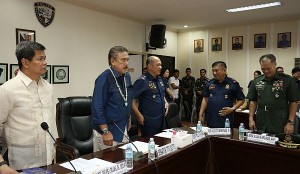
(From L-R) Sen. Vicente “Tito” Sotto III (second from left) with Usec. Felipe L. Rojas of the Dangerous Drugs Board; Chief Supt. Noli Taliño, PRO-7 director; Dir. Augusto Marquez; and Brig. Gen. Allan Arojado, deputy commander Central Command, attended the 6th Law Enforcement Coordinating Committee conference and Anti-Illegal Drug Summit in Camp Sergio Osmeña Sr.
CDN PHOTO/JUNJIE MENDOZA
Senate Majority Leader Vicente “Tito” Sotto III yesterday told law enforcers that they can now arrest and detain minors aged 12 to 17 who violate the laws against illegal drugs.
“Kailangan na makulong muna sila while they have to prove that they acted without discernment in committing the offense (They need to be detained while they have to prove that they acted without discernment in committing the offense),” he said.
Chief Supt. Taliño, director of the PRO-7, said he was willing to comply with what Sotto said as it is what the law states.
“Batas naman yan eh. Kapag may nahuli tayong 17 to 12 years old ay kulong kaagad. Sila ang magprove kung may discernment ba (That’s the law.
If we arrest 17 to 12 years old, then we will put them in jail. And then they will prove if they acted with discernment),” he said.
Amended
Unknown to many, he said the Juvenile Justice Law was already amended in Republic Act 10630 or the Act Strengthening the Juvenile Justice System in the Philippines.
Under the law which was amended in 2013, Sotto said law enforcers can now arrest and detain offenders aged 12 to 17.
Sotto encouraged the police to implement the law and to arrest everyone involved in illegal drugs.
The campaign against illegal drugs, Sotto said, must also involve minors.
No jail
But a closer look at Republic Act 10630 would show that nothing mandates law enforcers to put minor offenders in jail.
Lawyer Joan Saniel, executive director of the Children’s Legal Bureau, said, “That (putting minors in jail) is never allowed by law. While waiting for the determination of discernment or trial for offenders aged 15 to 17, they shall be placed in a place called Bahay Pag-asa, a youth facility.”
And since Cebu still has no Bahay Pag-asa, Saniel said it will be the court that will determine where to put the minors.
Most likely, she said, the minors will be housed by the Department of Social Welfare and Development (DSWD).
Saniel said the law stipulates that a child who is 15 years old or below at the time of the commission of the offense shall remain exempted from criminal liability.
Below 15
Section 6 of Republic Act 10630 amended Section 20-A of Republic Act 9344 such that “a child who is above 12 years of age up to 15 years of age and who commits parricide, murder, infanticide, kidnapping and serious illegal detention where the victim is killed or raped, robbery, with homicide or rape, destructive arson, rape, or carnapping where the driver or occupant is killed or raped or offenses under Republic Act No. 9165 (Comprehensive Dangerous Drugs Act of 2002) punishable by more than twelve (12) years of imprisonment, shall be deemed a neglected child … and shall be mandatorily placed in a special facility within the youth care faculty or ‘Bahay Pag-asa’ called the Intensive Juvenile Intervention and Support Center (IJISC).”
Saniel, however, said the offender shall be subjected to an intervention program of the government, unless he has acted with discernment.
She said children in conflict with the law, who have committed serious offenses like rape, homicide, murder and are involved in illegal drugs, would be involuntarily confined for not less than one year subject to the decision of the court.
On the other hand, a child above 15 years old but below 18 years old is exempted from criminal liability and will be subjected to an intervention program, unless it can be proven that the minor has acted with discernment.
“That is what the law states. It should be taken in the proper context,” Saniel said.
Anti-Drug Summit
Sotto was in Cebu for the Anti-Drug Summit held at the PRO-7 in Camp Sergio Osmeña.
He said a drug abuse resistance education program must be introduced especially in schools to inform students about the ill effects of prohibited drugs.
“A prevention program must be done as early as Grade 6 or 7 so that in the succeeding years, they will no longer be curious or interested in drugs because they know it is bad,” he told reporters in a short interview after the program.
“The bottom line is the day people stop buying illegal drugs is the day they (drug lords and other personalities) stop selling. If no one buys illegal drugs, whatever substance sold the market won’t be sold,” he added.